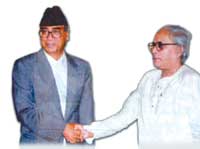 Even if he was planning to meet Maoists, Prime Minister Sher Bahadur Deuba couldn't have possibly fit them in during his hectic schedule in Calcutta 23-24 March. A visit to Howrah, banquet by West Bengal Governor Viren J Shah, puja to the godddess Kali, tours of two museums, and the next morning a half-hour talk with chief minister Buddhadev Bhatacharya (see picture, right).
Even if he was planning to meet Maoists, Prime Minister Sher Bahadur Deuba couldn't have possibly fit them in during his hectic schedule in Calcutta 23-24 March. A visit to Howrah, banquet by West Bengal Governor Viren J Shah, puja to the godddess Kali, tours of two museums, and the next morning a half-hour talk with chief minister Buddhadev Bhatacharya (see picture, right). However, Indian intelligence sources tell us three top Maoist leaders had entered West Bengal during the week of the Deuba visit and were staying at a safe house in Siliguri. Chandra Prasad Gajurel, the central committee member in charge of international relations, Mohan Baidya, the 60-something central committee member, and Top Bahadur Raimajhi, Maoist negotiator in the first round of talks, were there to see if they could meet Deuba and resume dialogue, sources said.
"It was the Maoists who were desperate to reopen talks with the government," one senior Nepali official accompanying the prime minister said. "The initiative came from them, not from Deuba."
He said Deuba was keen to get a consensus from other political leaders in Kathmandu before resuming talks. Initial Maoist feelers seem to have gone out while Deuba was in New Delhi, but the prime minister could not at such short notice change his disarm-before-negotiation stance.
A former Indian intelligence official and top expert on Maoists, Amiyo Kumar Samanta, told us this was standard Maoist tactics: "Under military pressure, they would look for fresh talks and send out feelers, and when the government turns them down they spread the rumour they are not keen to meet them."
Indian military analysts like Maj-Gen K K Ganguly feel Deuba may be waiting to see what kind of military help he can get from India, the United States and Britain so he can carry a bigger stick before talks resume. "If he gets something substantial without strings attached, he will keep pursuing the military option," Ganguly told us.
In the end, Deuba did sightseeing and seems to have hit it off well with Bhattacharya. Sources present at the meeting said both agreed about the common threat to Nepal and India from Maoists and the need for a concerted offensive. Bhatacharya later told the press the alliance between Nepali Maoists and the Peoples War Group and the Maoist Communist Centre was a major threat for India. He alleged that Pakistani military intelligence was backing the groups to destabilise India's strategic Siliguri Corridor. "It is in our mutual interests to fight the Maoists," Bhattacharya said.


